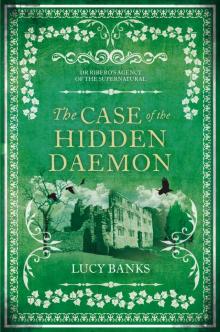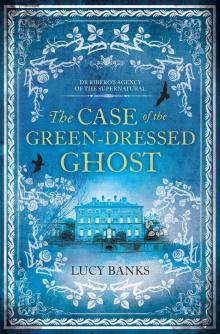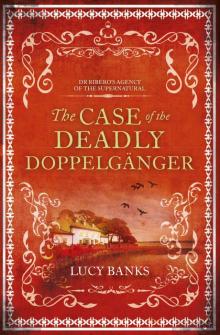- Home
- Lucy Banks
The Hanged Man and the Fortune Teller Page 5
The Hanged Man and the Fortune Teller Read online
Page 5
Arthur yawned loudly, then ambled over to join us, patting Eleanor on the shoulder as he passed.
“What did I miss?”
Fred sighed, then wiped his mouth with his sleeve. “Nothing, little brother.” He looked at me, and something passed between us, something dark and unhealthy. “Nothing at all.”
SIX
— 1969 —
THE GHOST DOES not understand this song the woman keeps playing, over and over, late at night. It sounds distasteful, with a plodding, grinding rhythm that sounds distinctly suggestive. Strange, given the almost ecclesiastical church organ thumping in the background, while a male and a female whisper to one another in an unfamiliar language.
The woman plays it on a round black plate, scratched ceaselessly by a small needle within a strange flat box. After she is done, long after the sun has set, she places the plate back in a paper case, which is blue. The ghost has read the wording several times in the past. Jane Birkin. Serge Gainsbourg. The names mean nothing to him, but that’s not unusual. Little means anything to him these days.
Her face glows by the lamplight, a lumpy cigarette smouldering in the ceramic dish beside her. The smoke trails aimlessly to the ceiling, which is already stained. She is unhappy, but then, that is how she always is. Her heart is suffused with sad, despairing love, made all the more desolate by the knowledge that her man does not love her back.
I have forgotten her name, the ghost realises, feeling guilty. He knows he should remember, they’ve been with her for a long time now. It begins with B, I’m sure of it. Or is it D? He looks around the apartment for clues, but fails to find any.
He thinks that she will smoke more of her strange cigarette, then pass out on the cushions that cover her living room floor. However, tonight she surprises him by staying awake. Her anxiety is evident from her continual fidgeting, the way she keeps loosening her dark hair from its bun, then gathering it up again. Finally, she looks at her clock; a polished wooden and glass box above her fireplace. Her man is not coming tonight, that’s very clear. Watching her mood plummet further, the ghost feels himself falling with her, dragged in on the wave of her emotion. It is always this way, which he supposes is why he stays with her. Otherwise, why else would he?
The Fortune Teller is in her usual position by the armchair, idly watching over them both. Sometimes, he forgets she is there; her quiet presence blends effortlessly into the surroundings. He knew her name, once. The essence of it slips over his tongue from time to time, before sliding away. Perhaps I should ask her to remind me, he thinks.
“You know we should move on soon,” she suggests, noticing his stare. “I understand your need to be here, but she’s only making you more distressed, not less.”
Yes, he thinks, a vague hint of a memory toying with his mind. I do have reason to be worried about her. He looks back at the woman, who has started to cry, leaving trails of black ink down both cheeks. Her sobbing wilts him, because it is a defeated sound; the grief of one who has already given up.
“I do not think we can leave her,” he replies flatly.
The Fortune Teller shakes her head. “There’s nothing we can do. She isn’t even aware that we’re here. No one ever is.”
That isn’t true, he thinks. There have been times when the woman has stiffened, peered earnestly in their direction, as though sensing their presence. And once, she mentioned it to her man, when they lay on the mattress on the floor, smoking and draped over one another like puppies. I think this place is haunted, she’d said, her naked skin shining in the light. He suspected that in his living days, he would have found it an erotic sight. Now, he only looks on with a vague, disconnected interest.
He tells the Fortune Teller about his memory, and she edges closer.
“That’s interesting,” she says carefully, the spectre of her shawl glittering in the dimness. “See, you do remember some things still.”
He nods, though the truth of it is that his memory fades with every passing moment. Images pass through his head like steam trains, whistling through with vivid brightness before vanishing again. Before, it frightened him badly. Now, he is beginning to accept it as an inevitable slide into nothingness. Perhaps he even welcomes it. It’s a chance to sink beneath the waves, to let everything go, and to simply forget.
“I remember my wife,” he says carefully, though even the memory of her is growing distant. Eleanor. He knows her name, and must hold it close, for if he loses that, he’ll lose everything.
The Fortune Teller groans. “Yes, but you don’t remember how she—”
A clatter breaks through her words. The woman has dropped one of her strange black musical plates, and it rattles on the floor like a discarded coin, before finally falling silent. He sees the cover, tucked neatly under her arm. Sgt. Pepper’s Lonely Hearts Club Band. Another favourite of hers, particularly one mournful song in the middle, about a girl leaving home. It’s another song that she likes to play again and again, whilst leaning back against her endless velvet cushions, crying quietly.
“Why don’t we go down to the river?” The Fortune Teller suggests, pointing at the door. “We can talk more about your memory, and how we can help you.”
Her concern makes him smile, if only for a moment. He admires her optimism and resilience, how she remains positive, despite the drudging depression of their existence.
“I do not think I can be helped.”
“That’s not true.”
“Besides, I want to stay here.” He’s reluctant to leave the woman. Her energy, bleak and draining as it is, stirs something within him, and he wonders if by staying with her, he’ll retrieve something of himself.
A hint of a smile plays at the Fortune Teller’s lips, before fading. “You always cling to lost souls, you know that, don’t you?”
“So you keep reminding me.” Aside from a dim recollection of the last person he’d stayed with, a sad-faced woman who kept staring at a photo of a man in uniform, he can’t remember any others, only occasional memories of faces, glimpses of personalities. An energetic teacher, married, fighting for some cause or other. A foppish man who drank too much. A hard-faced lady, with a strong, Scandinavian accent. Other people, swimming in and out of his mind like fishes through weeds. He doesn’t know who they were, but knows that he knew them once, not that it matters now.
The music has stopped. The silence of the apartment challenges the balance of the atmosphere, threatening to tilt it off-kilter. That’s why the woman plays the melodies, no doubt, to swell through each corner and block out the sadness. The ghost watches as the woman eases her arms into a coat, a tan-brown garment with oversized lapels, which she ties carelessly at the waist. She has cleaned her eyes, he notices, wiping away the streaks of black, repainting her lashes so they appear thick, brittle, and insectile. It is a strange fashion, but then, he has seen others do the same. Times have changed.
He follows her into the wintry night, not understanding why anyone would choose to be outside, when the wind bites like a snapping dog. A dusting of fine rain immediately clings to the woman’s hair, sending strands upwards in a frizzy halo. She turns away from the Thames, heading west along Lower Thames Street. He knows the route well; it leads towards St Magnus the Martyr; a church he remembers vaguely from his past. He avoids it wherever possible, there’s something about the whitewashed walls that makes him feel uncomfortable. Cursed creature, he thinks, without knowing why.
For a moment, he wonders if she is going inside, whether she seeks respite in the house of God, though such a gesture would surprise him. It seems most people these days have forgotten religion. Sure enough, she passes the church, then turns down a narrow side road, pressing a hand against the wall to balance herself in her towering shoes. Music throbs in the distance, muffled by the wind. Yet more music, he thinks wryly. This era seems unable to survive without it.
The ghost wouldn’t have noticed the black door, had the woman not stopped directly in front of it, rap
ping smartly before waiting, arms folded. The door’s surface absorbs the light from the street lamps, in a manner that’s vaguely threatening. A minute later, it opens, and a large-bellied man steps out, neck constricted by a too-tight collar.
“You on the list?”
It’s a strange way to greet a lady, the ghost thinks, waiting patiently. He’s noticed that impertinence seems almost acceptable nowadays, especially among younger people.
The woman keeps her gaze to the ground. “I need to talk to Frank,” she mutters. “Frank Tanner.”
Ah, he thinks. Now it makes sense. She has come in search of her man. He’d sensed her growing impatience, her need to be with him, back in her dwelling. And she believes he is here, concealed somewhere within this dark, threatening building. She shouldn’t go in, he thinks, feeling oddly protective of her. It isn’t a good place.
“Frank’s in a meeting.” The man rests both arms on the top of his stomach, implacable as a statue.
“It’s okay.” She scrabbles in the small bag around her neck, then pulls out a handful of scrunched notes, which he realises is modern money. “Here, have this. I won’t be any trouble, all right?”
How the ghost wishes that the man would shake his head and send her on her way. Yet he knows humankind too well, how easily they’re swayed by material wealth. Already, he can see the telltale gleam in the man’s eye; the fingers tensing around the money, ready to pull it to the safety of a jacket or trouser pocket.
“You’ve got ten minutes. Any more and there’ll be trouble. You got it?” She nods, pushing gratefully past him. The ghost has no other choice than to follow, drifting up the narrow stairs behind her. It’s dark, but the darkness is thicker, more syrupy than the ghost would like. It has a dense, watchful quality that suggests nihilism and dangerous intentions. It’s one of the worst aspects of his existence, these mists of torment that he experiences, laden with the promise of danger and unhappiness to come.
It is worse upstairs. The walls pulse with projected lights, which blob and shift with water-droplet ease; and people arch, bend, and fold, reminding him of reeds in a stiff breeze. Their eyes are wide, blank, oblivious to the world around them. Music pulsates, muting all other sound, an overpowering cacophony of drum beats, wailing, and chanting voices. It is unholy, depravity made into sound, and the ghost fights the urge to leave this stubborn woman to her inevitable misery.
A glaze-eyed man, hair scraped back in a bun, grasps her by the waist and drags her to the dance floor. The ghost feels her panic, flitting just beneath her skin; but also her weary acceptance. She has been touched like this before, he realises. Roughly, and without love. The vague warmth of anger floods over him, before sinking away again. Emotions are becoming increasingly difficult for him to summon these days; it’s as though they’re drifting on a tide, being pulled further and further out to sea.
“I’m Frank’s girl, Bernadette,” she hisses, extracting herself from the man’s octopus grasp. The words work; his eyes widen and he drops her immediately, only to melt back into the crowd.
Bernadette, that was her name, the ghost tells himself, relieved at how familiar it sounds to him. How could he have forgotten? He is sure it won’t happen again. Bernadette. And she is looking for Frank, he reminds himself, keen to establish the facts. He remembers Frank’s face: Angular, with stone-carved, harsh cheek bones. Full, cruel lips. Almost feminine in certain lights, though perhaps that’s because of Frank’s long, straggly hair, which so many men of this age seem to favour. He does not like Frank. As for the Fortune Teller, she shrinks whenever Frank is near. She claims he reminds her of her Strong Man, though the ghost is never quite sure who she’s referring to. Another of those old memories, now rotted to nothing, he thinks sadly.
But now is not the time for reminiscing. The woman has already pressed on, shoving past sweaty body after sweaty body, until she reaches a door at the back of the room. The music seems louder here, vibrating off the walls, drenching everything in madness. He has never heard such noise before, nor seen such darkness. It is a bad place. A terrible place.
And she is about to step into it, he realises, just as the woman prises the door open.
Beyond, the passageway is dim, the walls rough, plasterless, dirty. She has been here before, that much is clear as she presses towards a closed door at the end. It is a place of horrible things; the ghost can feel it oozing from every angle. For some reason, he feels as though he has been here before too, following someone else up this very corridor, before it became a place of vice and nastiness. Harry’s office, he thinks, without knowing who he’s thinking of, or why. A long time ago. Not anymore, though. And just like that, the memory is gone.
Without knocking, the woman pushes the door open and storms through. It is a simple enough room, not much in it besides a plain desk and a few battered plastic chairs surrounding it. He marvels briefly at the shiny black object on the desk, the thing with all the round buttons, each with a letter or number upon it. A typewriter. An innocuous enough item, and a seemingly nonthreatening space to accompany it. Yet it is not as innocent as it seems. The ghost can sense blood, hidden under the faded rug, scrubbed to a pinkish tinge. The walls shriek with violence and desperation.
Three men stare at the woman, at Bernadette. Silence prevails for at least ten seconds, if not longer, each of them motionless as a statue. The only thing that moves is the coil of smoke from one of the man’s cigarettes, trailing uneasily to the ceiling.
The ghost recognises Frank immediately, one hand resting on the desk, the other clenched in a tight, unforgiving fist. “What the fuck are you doing here, Bernie?” he snaps, without greeting her. This is how their relationship is, harsh tones and violent gestures, followed by moments of sweetness. A dangerous form of love, in his opinion.
Bernadette blinks, stupidly as a sheep. “You said you’d come over at nine o’clock, I waited hours for you, Frank, just like I do every time, and—”
He rolls his eyes. The other men laugh.
“Jesus Christ, woman.” Frank runs a hand over his hair, then glances at the other men. “I’ve got business here. Now go home, make yourself a drink, calm down and—“
“—I won’t calm down, I’m sick of calming down! We’re meant to be getting married, Frank. Doesn’t that mean anything?”
The man sitting behind the desk, the one in a suit, presses his fingers together, forming an arch towards the ceiling. “You need to go home now, love,” he says, and though the words are softly spoken, love lingers like a hammer in the air, full of threat.
She folds her arms, eyes already brimming. In a moment or two, the ghost knows she’ll cry, then those fat rivers of black will fall over her cheeks again, just as they always do. It fascinates and frightens him in equal measures, how monstrous and pitiful she looks.
“I’m only going home if he comes with me.”
Frank snorts, slams his fist down. “Don’t be so fucking ridiculous. You leave now, or I swear I’ll—”
“—you’ll do what? Hit me? Because that makes you the big man, doesn’t it? Hitting a woman.”
The two other men mutter, then stand. Neither are tall, but their presence bloats as they rise, swelling and filling the available space. The ghost retreats instinctively, watching as the shifting cloud of darkness twitches, settling more evenly around the woman’s head.
She is in trouble, he realises, keeping his eyes on her, afraid to look away. She has to leave, or risk taking a path she shouldn’t go down.
“Sweetheart,” the man behind the desk drawls, stretching each syllable with serpentine ease. “I asked you once, nicely. I won’t be so nice the next time. Frank needs to talk through some business, and you need to learn your place.”
Don’t answer back, the ghost begs, daring to edge closer, hoping to distract her with his presence. She doesn’t see him, he knows that much, but she shivers sometimes when he drifts too close. We have to leave, he communicates silently, praying she
’ll notice, at least on a subconscious level, otherwise it’ll end badly.
“Frank?” she says instead, laden with pain, uncertain as a child.
Frank shakes his head. “Go home. I’ll speak to you later.”
Finally, the tears come, as the ghost had known they would. The woman’s shoulder hits the door-frame on the way out, sending her off-kilter into the hallway, reeling like a spinning top.
I’m useless, I’m useless, I’m useless, she chants softly, eyes sightless, until she staggers to the room with the music. I’m a useless, dumb bitch. That’s what everyone says.
It is hard to cope with the emotion. The ghost pulls back, hating himself for his weakness. The woman spirals out of sight.
Later, he finds himself on a wide street, still busy with people, despite the late hour. He watches them pass; after all, what else is there to do? He can’t return to the woman’s apartment, not until she’s tethered her misery to more manageable levels. And he cannot brood on her, it is too painful to think about. Instead, he surveys the late-night crowds around him. The men and women wear strange trousers; tight around the upper leg, widening to triangles at the bottom. Their shirts are bright, gaudy, sumptuous as Indian royalty. It is a world that fascinates him, because it is so opulent, and so seedy.
Yet there is still chivalry among this chattering chaos. A man holds a door open as his wife passes through. Another wraps his arms around his beau, and the ghost hovers near, welcoming the glow of their love, which radiates out like an aftershock.
Why do I not attach myself to people like this? he wonders, with the hint of a smile. After all, he remembers love. He knows the pleasure of kissing a pale shoulder, of simply holding a lover close, feeling the lover’s chest rise against his own. Why is it that he is so attached to those who are in pain?
Perhaps it’s my purpose, he muses, drifting homewards on the breeze. To help them in some way. He wishes he understood his greater meaning, other than to try to find her. Eleanor, he reminds himself, struggling to pull her face into his memory. Above all else, he must grasp hold of her name, her face, the feel of her whenever she was near. If he loses that, there will be no point in carrying on.

 The Case of the Hidden Daemon
The Case of the Hidden Daemon The Hanged Man and the Fortune Teller
The Hanged Man and the Fortune Teller The Case of the Green-Dressed Ghost
The Case of the Green-Dressed Ghost The Case of the Deadly Doppelgänger
The Case of the Deadly Doppelgänger